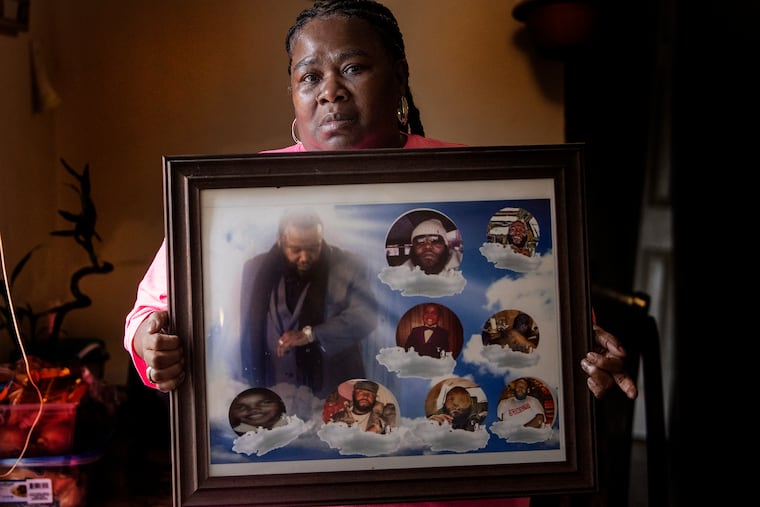Their sons died behind bars. They hope the public outcry for police reform reaches prisons. | Helen Ubiñas
“The reason why the whole world is about George Floyd is because it was televised and the whole world saw it,” Karen Brady said. “Our sons, it was shoved under the rug and nothing was said.”

The mothers, a thousand miles apart, watched the nationwide calls for justice grow louder.
Karen Brady, at home in Florida, watched the swarms of impassioned demonstrators on her television not far from the urn where she keeps her son’s ashes.
Diane Davis watched from the Philadelphia neighborhood where she raised her firstborn.
Thousands were taking to the streets across the country to demand police accountability following the killing of George Floyd by a police officer — the spark, many hope, for long overdue police reform.
But for these mothers reliving agonizing memories of being told their sons died behind bars, the movement is something else: a desperate hope that the public outcry on the streets will find its way to the steel and cement fortresses where abuses often go unreported.
Brady can’t talk about what happened to her son in 2011; family lawyers signed a confidentiality agreement as part of a $300,000 wrongful-death lawsuit they won against the city. But multiple published accounts chronicle her son’s last moments: Mike Brady, sick from detoxing after his latest drug arrest, went to the Curran-Fromhold Correctional Facility’s infirmary. Returning to his cell, he felt sick again and asked the correctional officers to escort him back to the infirmary. They refused. When he collapsed, unable to walk, he was pepper-sprayed and dragged barely conscious back to the infirmary. The city Medical Examiner’s Office declared he died from hypertensive heart disease. There was no mention of the guards’ role.
Davis’ son, Michael, was incarcerated at the city’s Detention Center facility when he died March 3, 2014, four days after he was jailed for his involvement in a shooting outside a North Philadelphia nightclub. Even before an official autopsy, his family was told he died of natural causes, but Davis’ relatives suspected something else when they went to identify him at the morgue and saw he had swollen black eyes, a split lip, and bruises on his head and body. Prison sources told the Daily News at the time that Davis was dragged face down to the mental-health unit. A civil lawsuit against the city was settled for $300,000 in 2016. The Medical Examiner’s Office eventually ruled that Davis died of hypertensive heart disease and declared his death natural. Their report did not explain several cuts to his face.
The mothers got to know each other over the years, bonded by grief compounded by nagging doubts. As the police killing of Floyd galvanized a nation, they turned to each other again, commiserating over fresh despair that the deaths of their sons barely registered outside of their families.
“The reason why the whole world is about George Floyd is because it was televised and the whole world saw it,” Brady said. “Our sons, it was shoved under the rug and nothing was said.”
“Nobody cared about my son,” said Davis. “It bothers you when you see all the people coming together for one but not others. I have to admit, it bothers me a little bit.”
Criminal justice reform advocates understand their agony. There is a direct line between the systemic racism and police brutality captured on the streets and the abuses often hidden away inside prisons.
“When I saw the news reports about what happened to George Floyd, I immediately thought of our clients,” said Su Ming Yeh, executive director of the Pennsylvania Institutional Law Project. “Accountability can be extremely difficult, but they’re the same parallels in terms of systemic overuse of power over individuals who really should be in their care.”
Dying at the hands of an officer demands attention wherever it happens, said Robert Saleem Holbrook, director of community organizing at the Abolitionist Law Center.
“Whenever someone is murdered at the hands of law enforcement, that is state-sanctioned violence — whether it is in prison or on the streets.”
Except, he and other advocates concede, that’s not necessarily how the public sees it, especially when people who are incarcerated are so often reduced to their offenses.
“I think it’s easy to see in a case like George Floyd — did he deserve to die over $20, or Eric Garner, over loosie cigarettes,” said Nicole Gonzalez Van Cleve, an associate professor of sociology at Brown University who has written extensively on these issues.
Absent horrific videos of police brutality, that same humanity isn’t often extended to people behind bars.
Advocates are hopeful that renewed momentum over police reform will push long overdue measures through, including increased transparency in prisons, reducing solitary confinement, and creating independent ombudsman offices with the power to investigate and discipline correctional officers.
At the very least, the rest of us can start here:
Eric Garner, Michael Brown, Tamir Rice, Breonna Taylor, George Floyd. ... They were all someone’s child.
So were Mike Brady and Michael Davis and so many others who died behind bars, leaving only their loved ones to mourn their deaths and cry out for justice.